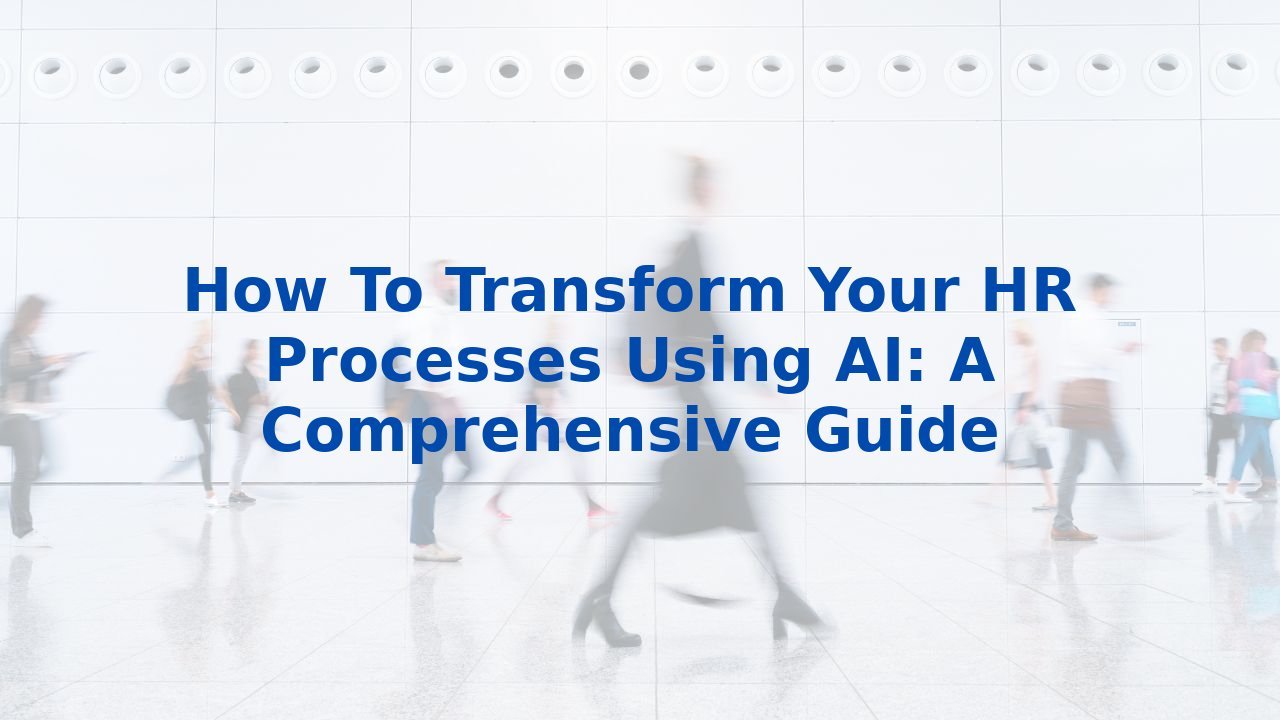How To Transform Your HR Processes Using AI: A Comprehensive Guide
How To Transform Your HR Processes Using AI: A Comprehensive Guide
Introduction
In a world where efficiency is the name of the game, Human Resource Management (HRM) often finds itself as a pivotal point for transformation. Businesses are increasingly driven by the quest for streamlined operations and optimized processes. Enter artificial intelligence (AI): a game-changing force in HRM that can redefine how organizations function. This guide dives into the transformative potential of AI within key HR processes, including Recruitment, Time & Leave Management, Payroll, and Performance Appraisal.
AI in Recruitment Management
Recruitment serves as the bedrock for an organization’s success, directly affecting workforce quality and diversity. Here’s how AI can elevate recruitment efforts:
- Automating Candidate Screening: With the help of AI algorithms, sifting through resumes becomes a breeze. AI can pinpoint candidates who meet specific criteria much faster than human recruiters, thus eliminating hours of manual reviewing.
- Predictive Analytics: Drawing on historical data allows AI to assess a candidate's potential success within a role. This predictive element minimizes the risk of poor hiring choices.
- Chatbots and Virtual Assistants: These AI-powered tools can address initial candidate questions, ensuring that HR teams are free to concentrate on strategy rather than administrative tasks.
Streamlining Time & Leave Management
Managing employee time and leave effectively is crucial for sustaining productivity. AI offers some significant improvements:
- Automated Leave Requests: AI can automate the leave application process, ensuring compliance with company policies while enhancing employee satisfaction.
- Predictive Trends: By analyzing data patterns, AI can spot signs of workforce burnout or potential turnover, allowing for timely interventions.
- Real-Time Reporting: Managers can utilize AI-generated reports on attendance and leave, enabling informed decision-making at a glance.
Enhancing Payroll Management
Payroll can be a labyrinth of complexity. Luckily, AI simplifies many aspects:
- Automated Payroll Processing: AI streamlines payroll calculations, ensuring both speed and precision while reducing the chances of human error.
- Staying Compliant: Keeping abreast of constantly changing labor laws can be daunting. AI provides continuous monitoring to help organizations remain compliant.
- Instant Payroll Insights: With real-time data access, managers can easily review payroll reports, leading to efficient approvals and corrections.
Performance Appraisal Made Easier
Performance evaluations play a vital role in employee development. Here’s how AI can enrich this crucial process:
- Automated Performance Tracking: AI can monitor performance metrics over time, offering insights that help managers pinpoint both strengths and areas needing development.
- Predictive Analytics for Growth: Analyzing trends generates forecasts on future performance and identifies training needs, ensuring that individual objectives align with organizational goals.
- Personalized Feedback: With AI generating tailored feedback reports, employees can receive ongoing constructive criticism based on actual metrics, heightening their development paths.
The Benefits of Incorporating AI in HRM
The fusion of AI into HR processes yields numerous advantages:
- Boosted Efficiency: Automating routine tasks frees HR teams to dedicate time to strategic initiatives.
- Elevated Accuracy: Automated systems reduce the chance of errors, delivering reliable data consistently.
- Data-Driven Decision-Making: AI provides valuable insights, enabling businesses to make informed choices based on data rather than intuition.
- Enhanced Employee Experience: Personalized AI support can significantly improve employee satisfaction, fostering a healthier workplace culture.
The Importance of Employee Training for AI
For AI implementations to reach their full potential, organizations must prioritize employee training:
- AI Literacy: Replacing misconceptions with understanding equips employees to navigate AI systems confidently.
- Prompt Engineering: Training on how to formulate effective inquiries ensures that employees receive the best outputs from AI tools.
- Evaluative Judgment: Critical evaluation of AI-generated data fosters informed decision-making and furthers employee engagement in the process.
Conclusion
AI is more than just a technological advancement; it’s a strategic partner in revolutionizing HRM. By automating mundane tasks and providing in-depth insights, organizations can enhance efficiency and cultivate a superior employee experience. The time has come for forward-thinking businesses to embrace AI not just in HRM, but throughout their organization. As we look ahead, equipping employees with the essential skills to work alongside AI will unlock even greater transformative potential.



